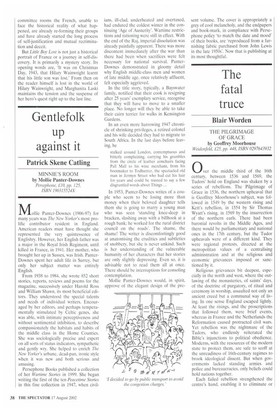Gentlefolk up against it
Patrick Skene Catling
MINNIE'S ROOM by Mollie Panter-Downes Persephone, £10, pp. 125, ISBN 190315524X
ollie Panter-Downes (1906-97) for many years was The New Yorker's most prolific contributor resident in England. American readers must have thought she represented the very quintessence of Englishry. However, her English father was a major in the Royal Irish Regiment, until killed in France, in 1941. Her mother, who brought her up in Sussex, was Irish. PanterDownes spent her adult life in Surrey, but only her subject matter was entirely English.
From 1938 to 1984, she wrote 852 short stories, reports, reviews and poems for the magazine, successively under Harold Ross and William Shawn, its most beneficial editors. They understood the special talents and needs of individual writers. Encouraged by her editors, and perhaps temperamentally stimulated by Celtic genes, she was able, with intimate perceptiveness and without sentimental inhibition, to describe compassionately the habitats and habits of the middle class in the Home Counties. She was sociologically precise and expert on all sorts of status indicators, sympathetic and gently wry. She helped to enrich The New Yorker's urbane, dead-pan, ironic style when it was new and both serious and amusing.
Persephone Books published a collection of her Wartime Stories in 1999. She began writing the first of the ten Peacetime Stories in this fine collection in 1947, when civil
ians, ill-clad, underheated and overtaxed, had endured the coldest winter in the continuing 'Age of Austerity'. Wartime restrictions and rationing were still in effect. With the end of the Raj, imperial dissolution was already painfully apparent. There was more discontent immediately after the war than there had been when sacrifices were felt necessary for national survival. PanterDownes demonstrated in gloomy detail why English middle-class men and women of late middle age, once relatively affluent, felt especially aggrieved.
In the title story, typically, a Bayswater family, notified that their cook is resigning after 25 years' exemplary service, recognise that they will have to move to a smaller place. No longer will they be able to take their cairn terrier for walks in Kensington Gardens.
In an even more harrowing 1947 chronicle of shrinking privileges, a retired colonel and his wife decided they had to migrate to South Africa. In the last days before leaving, he
stalked around London, contemptuous and bitterly complaining, carrying his grumbles from the circle of leather armchairs facing Pall Mall to his wine merchant, from his bootmaker to Todhunter, the spectacled old man in Jermyn Street who had cut his hair for years and could be trusted to say a few disgruntled words about Things ...
In 1953, Panter-Downes writes of a couple who seem to be losing more than money when their beloved daughter tells them she is going to marry a young man who was seen 'standing knee-deep in bracken, slashing away with a billhook at a rough bank; he worked for the rural district council on the roads'. The shame, the shame! The writer is discomfortingly good at anatomising the crudities and subtleties of snobbery, but she is never unkind. Such is her understanding of the vulnerable humanity of her characters that her stories are only slightly depressing. Even so, it is advisable not to read them all at once. There should be interruptions for consoling contemplation.
Mollie Panter-Downes would, in spirit, approve of the elegant design of the pre
sent volume. The cover is appropriately a grey of cool melancholy, and the endpapers and book-mark, in compliance with Persephone policy 'to match the date and mood' of their books, are 'reproduced from a furnishing fabric purchased from John Lewis in the late 1950s'. Now that is publishing at its most thoughtful.






























































 Previous page
Previous page